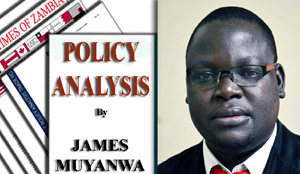 LIKE I stated last week, today’s article looks at the mixed economy and some proposed policy measures the Government can employ to address some of the current ills.
LIKE I stated last week, today’s article looks at the mixed economy and some proposed policy measures the Government can employ to address some of the current ills.
Last week, I discussed the free-market economic policies and socialism as espoused by Zambia at one time or another.
Having looked at some of the shortcomings of these two economic systems, I had proposed the full engagement of the mixed economic system.
At one time, we were told that the Government “has no business in business” but I think the government’s role will always be desirable in business.
The question should be, to what extent?
From last’s week write up, we saw that the market forces have been failing to effectively address some issues, especially on the goods distribution chain.
In short, the Government should directly be involved in the production and supply of some goods and services. Not just public goods!
Zambia Consumers Association (ZACA) executive director Muyunda Ililonga during the week alluded to that.
I strongly share Mr Ililonga’s sentiments that the Government should participate in the production and supply of some essential commodities to the consumers as a long-term measure to help reduce prices.
I know to some people this might sound like advocating the return of nationalisation or price controls but that is not it.
Like Mr Ililonga, I feel that the Government should be involved in the production and marketing of essential commodities such as mealie-meal to create market competition and ease the price of such commodities.
Since the Government already participates in the production and marketing of maize through the Farmers Input Support Programme (FISP) and the Food Reserve Agency (FRA) respectively, it needs to move a step further.
It should get involved in the production and supply of the final product – mealie meal – to ensure that more citizens benefit from the current FISP up to the dinner table level.
This can be done by deliberately establishing milling plants in all provincial centres and other strategic districts.
The Government can either directly set up milling plants or encourage the government departments like the Prisons Service which already has a milling plant in Kabwe and the Zambia National Service to run these facilities.
Whatever the case, the Government should, through FRA, be offloading the subsidised maize to the milling plants or firms alongside the private sector but ensure that for the Government plants the prices are reflective of the subsidies.
Another field which needs such Government intervention is the transport sector where, like stated last week, the benefits of lowering fuel prices and cost of production rarely trickle down to the final consumers.
Like I observed, Government administrations, past and present, have introduced measures aimed at lowering the prices of fuel, for instance, but the benefits of these efforts rarely have ripple effects on the bus fares.
The scenario in both of the cases cited is caused by the cartels which are masked in associations which decide the final prices of mealie-meal and fares for the public buses.
To break the transport cartel and ensure the travellers benefit from any reduced pump prices for fuel, the Government can come with up with a fleet of both big buses and mini-buses to service the people on trunk and township routes.
Unlike those for the private sector, the fares for these buses should be reflective of actual cost of operating the business, meaning that whenever there is a reduction in fuel prices the fares will be instantly lowered in the same manner the operators respond to increases in fuel prices.
Such a move would provide two kinds of benefits for the citizens, they will enjoy the fruit of the reduced fuel prices and they will have choice to either board the private or Government buses.
Because of the cut-throat competition such a move would entail the Government buses would become the pace-setter in the sector.
I am, however, aware that there existed the United Bus Company of Zambia (UBZ) which did not perform well.
Unlike the way UBZ operated, what I am proposing is not a situation where the Government deliberately sets low fares and dispatches buses even to places where it is uneconomical to operate.
This one would operate as profit-making entity but the fares should be cost-reflective, meaning that the lower the cost of production – especially in terms of fuel prices – the lower the fares and vice versa.
Similar intervention can be replicated in other sectors like we already have Zamtel in the mobile telecommunication sector, National Savings and Credit Bank in the banking sector and others.
This, in my view, is the only way of addressing the current exploitation of consumers by the millers, bus operators and other people with the means of producing and distributing goods and service for the consumers.
Contribute by calling: 0955 431442, 0977 246099, 0964742506 or e-mailing to: jmuyanwa@gmail.com.com






